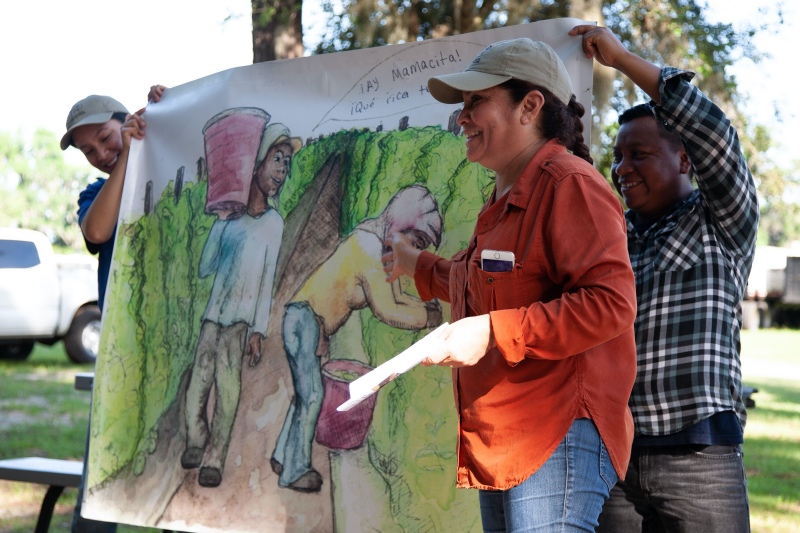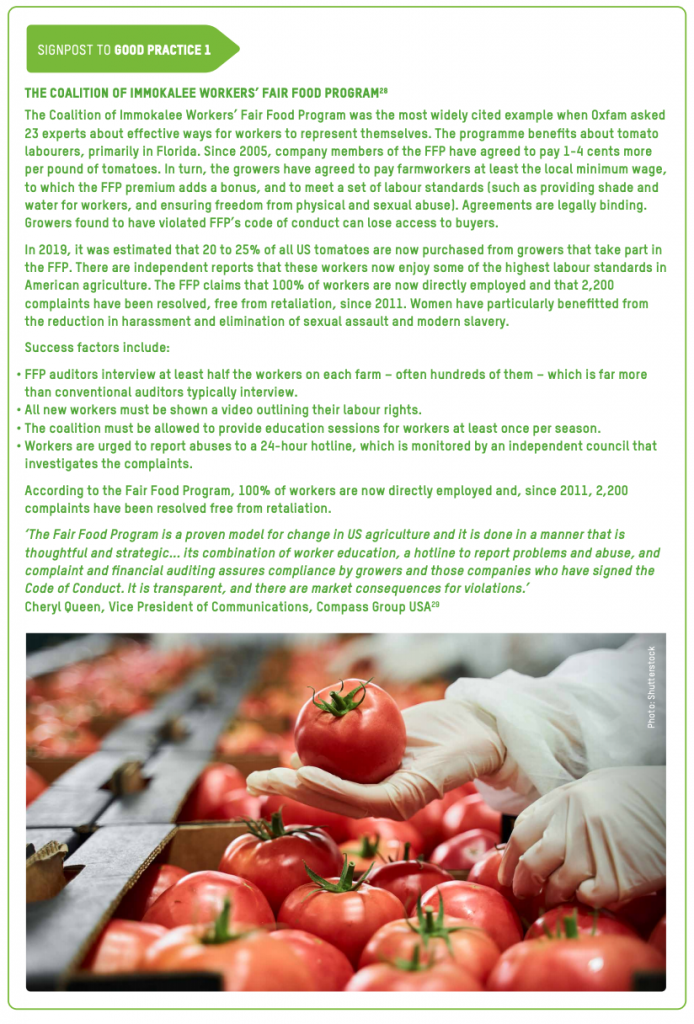
“The Coalition of Immokalee Workers’ Fair Food Program was the most widely cited example when Oxfam asked 23 experts about effective ways for workers to represent themselves.”
Meanwhile, Wendy’s seeks a new Director of Corporate Social Responsibility to rearrange the deck chairs…
The Fair Food Program continues to set the bar for corporate social responsibility. The latest recognition comes straight from a full-page spread in a new report from Oxfam Great Britain. The report itself was an unusual commission by UK-based food and footwear giant Marks & Spencer, meant to help give the company objective insights into its own supply chain in order to meaningfully improve working conditions in its suppliers’ operations. The writers zeroed in on a critical benchmark they called “worker voice” – the ability for workers to express themselves and effectively advocate for their needs, free from retaliation. In a full-page spread in the report, the Fair Food Program was designated the “Signpost for Good Practice” for worker voice, after 23 peer experts weighed in.

Last summer, the independent nonprofit MSI Integrity published a similar conclusion after more than a decade of research on fair trade schemes and corporate social responsibility: the Fair Food Program is the “emerging gold standard.” The MSI Integrity report pointed to the failures of multi-stakeholder initiatives, including most “fair trade” labeling schemes, to live up to their intended purpose. The foundational ways these initiatives fall short – from lack of worker involvement to disempowering and toothless monitoring and reporting – stood in sharp relief to the pillars of the Fair Food Program model.
It’s no coincidence that the Fair Food Program has repeatedly topped lists from researchers, journalists, and advocates seeking reliable evidence of human rights promotion in supply chains. The program was not created in a lab or drafted in a boardroom, it was built in the fields, in the community centers and women’s circles, and within a community of workers themselves. The vision of farmworkers on what a safe and fair workplace could look like formed the basis of the Code of Conduct; worker-to-worker education supercharges the Program’s ability to monitor conditions in real-time, alongside the independent monitoring of the Fair Food Standards Council; and that monitoring is backed by binding-and-enforceable market consequences from the Program’s Participating Buyers. These organic capacities, woven in by design, simply don’t exist in any other model of corporate social responsibility. What makes the Fair Food Program effective is also what makes it unique: the rights-holders for whom the program is designed are its architects and empowered as its enforcers. That’s not a matter of abstract philosophy, it’s just what works.
Ten years after we started it here in Immokalee, the Fair Food Program is generating hope in other workplaces. Worker-driven Social Responsibility, the model of change that underpins the FFP, is now being adapted and replicated in new industries – from dairy farms to construction sites to fashion runways. The 23 experts that Oxfam interviewed are joining a collection of workers, organizers, researchers, and enlightened philanthropists who have concluded that for workers’ human rights to be recognized, for their “voices” to be heard, they must be at the head of the choir, holding the microphone.
Meanwhile, in a move that breaks the mold on irony, Wendy’s is turning to LinkedIn to recruit a new Director of Social Responsibility who will be tasked with establishing the fast-food company “as a leader committed to social, environmental, sustainability, philanthropic and economic issues.” One “priority subject” for this new director? “human rights.”
We can’t help but point out that when it comes to human rights, Wendy’s stands alone among fast-food leaders in its refusal to join the one program actually proven to protect farmworkers from sexual assault, wage theft, and modern-day slavery. While all its main competitors have long since seen the benefits to their companies, their consumers, and the world, Wendy’s has taken an alternative approach: Stiff-arm the Fair Food Program and shift its produce purchasing around like a street-corner shell game master, from Florida to Mexico, from Mexico to greenhouses, all the while staying one step ahead of customers’ calls to join the FFP and keeping their supply chain cloaked in secrecy.
Whoever lands this role will have the unnecessarily difficult task of positioning Wendy’s as a global leader in CSR while simultaneously justifying its absence from the “gold standard” of social responsibility programs. We can only hope Wendy’s new CSR director will see the light — if only to make his or her own job a little easier.
